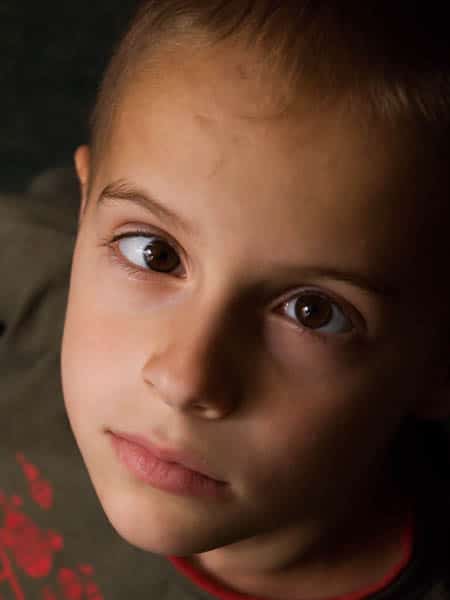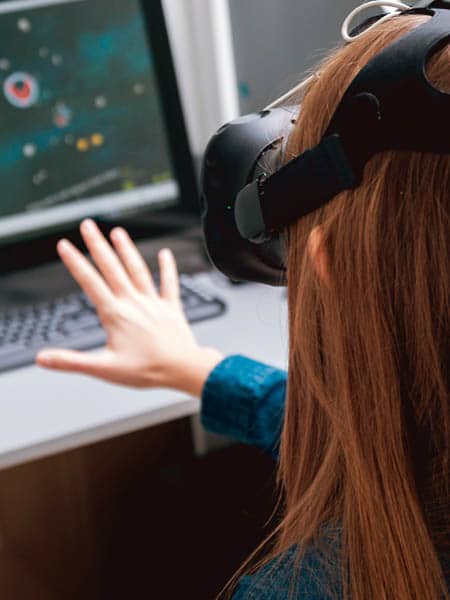A Program of Vision Therapy is Sometime the Best Treatment
Vision therapy can often help improve visual acuity in children and adults whose vision problems cannot effectively be treated or eliminated with glasses, contact lenses or patching of one eye. A program of vision therapy is sometimes the best course of action to address visual difficulties that have their origin in muscular dysfunction.
Conditions that respond to vision eye therapy
The following visual difficulties, whether in children or adults, may benefit from a course of eye therapy:
Vision problems related to learning difficulties
Individuals who are lacking necessary visual skills can be helped through vision therapy. These skills include those necessary for reading, writing and learning. Specifically, the individual may have difficulty controlling eye movement and focusing properly. In addition, children and adults who have difficulty with convergence, visual memory skills and hand-eye activities may benefit from a prescribed course of eye therapy treatment.

Developmental Optometry or Behavioral Optometry
The core principal of behavior optometry or developmental optometry is that vision is a process we learn, and it can be developed, enhanced, rehabilitated, or relearned regardless of the patient’s age. The continued education beyond the basic Doctor of Optometry (O.D.) degree emphasizes the use of lenses, prisms and vision therapy to improve a patient’s visual capabilities. These treatments can work to reduce visual stress, and prevent or rehabilitate vision problems. The behavioral optometrist works as a member of the rehabilitation team, bringing his or her experience in treating vision problems associated with traumatic brain injury to the overall treatment program.
Poor 2-eyed coordination (inadequate binocular vision)
For the eyes to work properly, they must coordinate and work together as a team. This gives us our binocular vision. When the eyes do not work together as a team, difficulties develop in proper performance. The individual may struggle with problems in reading, with depth perception, difficulties in sports and problems making eye contact.
Convergence Insufficiency
This disorder is the leading cause of many common eye complaints, such as eyestrain, double vision (diplopia), blurred vision and headaches. It can interfere with a person’s ability to see in general, to read and learn effectively, and to work at close distances. Recently, the National Eye Institute funded a scientific research study by the Mayo Clinic. This study determined that vision eye therapy done in the office and under the supervision of a trained eye care professional has the highest rate of improvement and/or elimination of this disorder.
Vision therapy for amblyopia, diplopia and strabismus
Vision therapy for lazy eye has shown a more substantial cure rate when compared to more traditional treatments such as surgery on the affected eye(s), prescription eyeglasses and/or patching alone. Lazy eye, or amblyopia, can be helped regardless of age. Vision therapy can also improve or eliminate double vision (diplopia) and crossed-eyes, wandering eyes and eye turns (strabismus). Vision therapy has shown that age is not a factor in the effectiveness of treatment, disproving the long-held belief that a child with lazy eye could not be helped if he/she was past age 7.
Visual problems related to stress
Today’s busy world demands that our vision perform at an optimum level. Both children and adults are constantly required to utilize their near vision at school, at work and at home. Stresses brought on by environmental factors, such as working at a computer for an extended period of time or close, vision intensive work, can cause blurred vision, eyestrain and headaches. These vision abnormalities can even lead to vision-induced stomach discomforts and motion sickness.

Special Needs
There are many different conditions and events that can result in the need for visual rehabilitation. Just as you may need to consult a physical therapist or occupational therapist after a traumatic event, you may also need to consult with a vision therapist as a matter of completing your recovery. Some types of special needs injuries or events that may benefit from vision therapy are:
- traumatic brain injury (TBI)
- stroke (cerebral vascular accident or CVA)
- injury at birth
- brain damage
- head injury, including concussion
- whiplash
- cerebral palsy
- multiple sclerosis (MS)

Certain disorders associated with developmental delays can also see improvement through a regimen of vision therapy. Some of these special needs that can benefit from visual rehabilitation are:
- visual-perceptual deficits
- visual-motor deficits
- attention deficit disorders
- certain autism spectrum disorders
- Sport vision
Vision Therapy for Sports
Success in any sport is dependent on strong visual skills. It all comes down to coordination: your eyes must transmit visual signals that your brain uses to tell your hands and body how to react to the situation and what to do. Eye therapy exercises and treatments under the care of a vision therapy specialist can measure and help improve hand-to-eye coordination and visual reaction time. Vision therapy can improve peripheral vision and the eye’s ability to focus. The ability of the eyes to work as a team and to track can also show dramatic improvement with vision therapy. Children and adults can show improvement in coordination abilities and sports through vision therapy.
Vision Therapy Treatment Plan
Vision eye therapy is a course of treatment prescribed by a trained optometrist. It involves the formulation of a treatment plan that is designed for each individual specifically. This means the eye therapy exercises you’re prescribed are tailored for your individual problems and specific needs.

CONTACT US
Vision Care & Therapy Center

Dr. Janna Iyer, FCOVD
Dr. Alayna Larsen
11735 Pointe Place
Roswell, Ga 30076
678-256-3990
Office Hours
Mon-Thu 9:00am-6:00pm
Fri 9:00am-1:00pm
Appointments
678-256-3990
Patient Infomation

